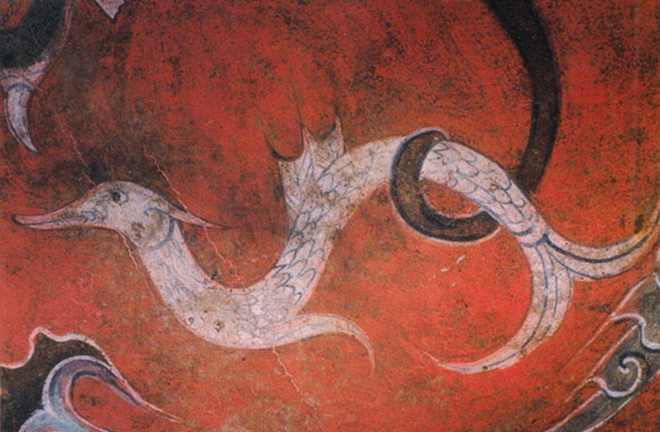Marine literature expects theoretical improvement

FILE PHOTO: A pattern on the King Liang Mausoleum murals in the Han Dynasty (206 BCE–220), in Yongcheng, Henan Province, believed by some to depict the Chinese version of a “mermaid” named Yufu in The Classic of Mountains and Seas
Compared with the richness of marine literary creations in China, the study of marine literature is still in its infancy, with theoretical research still under exploration.
Definitions
Since the 1990s, Chinese scholars have increasingly noticed the field of marine literature and made certain achievements. However, there is still no clear definition of what marine literature is academically, although marine literature is generally considered a themed literary genre, reflecting people’s understanding and imagination of the ocean.
According to Xiu Bin, dean of the College of Liberal Arts, Journalism, and Communication at Ocean University of China, generally speaking, marine literature takes the sea as the background and stage, or as the descriptive and narrative object, or reflects the relationship between man and the ocean. Marine literature often involves ocean space, ocean society, interactions between man and ocean, ocean imagery, ocean spirit, and so on. It is an integral part of marine culture, possessing the dual attributes of literature and marine culture.
Teng Xinxian, an associate professor from the College of Marine Culture and Law at Shanghai Ocean University, said that marine literature is a kind of aesthetic ideology reflecting the marine social life in the writer’s mind through the art of language. All literary works that take marine social life as aesthetic objects fall into the category of marine literature.
Although marine literature overlaps with other literary types, it has its own characteristics, said Wang Songlin, a professor from the Faculty of Foreign Languages at Ningbo University. Marine literature can be divided into a broad and narrow sense. In a broad sense, it refers to literary works or documents related to the sea, sailors, ships, or islands, recorded and handed down in a written or oral form. In a narrow sense, marine literature refers to literary works that take the ocean or marine experience as writing objects and aim to highlight the value relationship between man and sea and the aesthetic implications that go hand-in-hand with that relationship. On the whole, marine literature includes literary works that, against an oceanic background, take sea, sailors, islands, and ships as major elements to show relationships between man and sea, man and self, man and society, and man and man. It is writings on the theme of the ocean or based on marine experience. The focus of marine literature is on embodying the ocean spirit and ocean consciousness.
Research focus
The study of marine literature in China, which can be split into the two categories of Chinese marine literature and foreign marine literature, has roughly transitioned from the unconscious engagement of marine literature, to endeavors by a few scholars on marine literature, marine literary writers, and marine literary works, and then to independent in-depth research. With the implementation of China’s maritime power strategy, marine literature has grown into a research hotspot. Yet, efforts are mainly focused on foreign marine literature, lacking deep research on Chinese marine literature.
Since the 21st century, the study of marine literature has begun to receive attention in China and gradually formed a certain scale, Wang added. Researchers mainly concentrate on ancient marine literature. On the whole, research on Chinese marine culture is deeper than that on its marine literature, and research on foreign marine literature is more expansive that on domestic marine literature. As for research methods, Chinese scholars have gone beyond the ontological study of marine literature and employed interdisciplinary research. They excavate from marine literature such topics as the ocean and national identity, maritime rights and national image, and the ocean and ecology, from the perspectives of geopolitics, anthropology, and historiography.
Ding Yuzhu, director of the Institute of Marine Literature and Art at Ocean University of China, noted the content domain of Chinese marine literature. In the field of ancient Chinese marine literature, scholars have gradually extended from marine myth, poetry, and prose in ancient China, to marine fiction and drama. In the field of China’s modern and contemporary marine literature, initial research centers on contemporary Chinese marine fiction. With the diachronic development of research, it has deepened to the study of Chinese contemporary marine prose, poetry, and films and television. It has progressed from comparative studies between ancient and modern, Chinese and foreign marine literature to marine literature’s prototype study, ecological research, and marine spirit, lifting the significance of marine culture in the study of Chinese marine literature.
Theoretical improvement
The internal connections between marine literature and the marine historical course, as well as the relationship among marine consciousness, marine spirit, and national identity contained in marine literature, need further explanations. Wang suggested clarifying the development of marine literature with reference to general global marine history, and conducting a special study on the marine cultural community threaded by marine literary narratives. It is also necessary to figure out how marine literary works shape images through unique language, characters, metaphors, or symbolic art, symbolize these images, imperceptibly infiltrate them into national minds, and form a conscious ocean awareness.
Scholars should strive for a new evaluation standard with Chinese cultural characteristics, Teng concluded. Most scholars currently use Western literary criticism theory to examine ancient Chinese marine literature. However, there are some differences between Eastern and Western concepts of marine culture and literature. China advocates harmony between man and nature. Thus, its literary works are primarily lyrical, and its literary criticism highlights poetic imagery and spiritual resonance. The West emphasizes the opposition between man and nature. Its literary works are mainly narrative, and literary criticism prefers typicality, featuring solemn, stirring, and sublime colors. Western classic marine literary works are not an appropriate yardstick to measure Chinese marine literature.
Edited by YANG LANLAN
